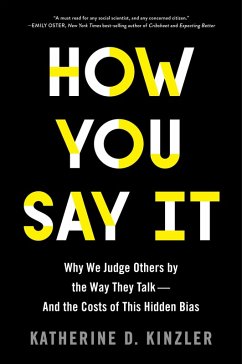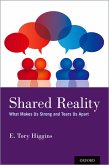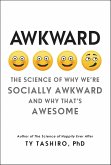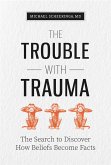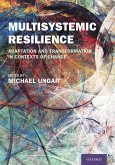From "one of the most brilliant young psychologists of her generation" (Paul Bloom), a groundbreaking examination of how speech causes some of our deepest social divides-and how it can help us overcome them
We gravitate toward people like us; it's human nature. Race, class, and gender shape our social identities, and thus who we perceive as "like us" or "not like us." But one overlooked factor can be even more powerful: the way we speak. As the pioneering psychologist Katherine Kinzler reveals in How You Say It, the way we talk is central to our social identity because our speech largely reflects the voices we heard as children. We can change how we speak to some extent, whether by "code-switching" between dialects or by learning a new language; over time, our speech even changes to reflect our evolving social identity and aspirations. But for the most part, we are forever marked by our native tongue-and are hardwired to prejudge others by theirs, often with serious consequences. Someone's accent alone can determine the economic opportunity or discrimination they encounter in life, making speech one of the most urgent social-justice issues of our day. Our linguistic differences present challenges, Kinzler shows, but they also can be a force for good. Humans can benefit from being exposed to multiple languages-a paradox that should inspire us to master this ancient source of tribalism and rethink the role that speech plays in our society.
We gravitate toward people like us; it's human nature. Race, class, and gender shape our social identities, and thus who we perceive as "like us" or "not like us." But one overlooked factor can be even more powerful: the way we speak. As the pioneering psychologist Katherine Kinzler reveals in How You Say It, the way we talk is central to our social identity because our speech largely reflects the voices we heard as children. We can change how we speak to some extent, whether by "code-switching" between dialects or by learning a new language; over time, our speech even changes to reflect our evolving social identity and aspirations. But for the most part, we are forever marked by our native tongue-and are hardwired to prejudge others by theirs, often with serious consequences. Someone's accent alone can determine the economic opportunity or discrimination they encounter in life, making speech one of the most urgent social-justice issues of our day. Our linguistic differences present challenges, Kinzler shows, but they also can be a force for good. Humans can benefit from being exposed to multiple languages-a paradox that should inspire us to master this ancient source of tribalism and rethink the role that speech plays in our society.
Dieser Download kann aus rechtlichen Gründen nur mit Rechnungsadresse in A, B, BG, CY, CZ, D, DK, EW, E, FIN, F, GR, HR, H, IRL, I, LT, L, LR, M, NL, PL, P, R, S, SLO, SK ausgeliefert werden.

